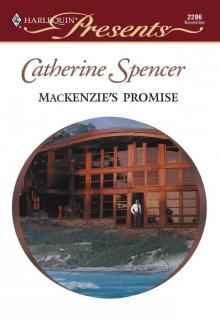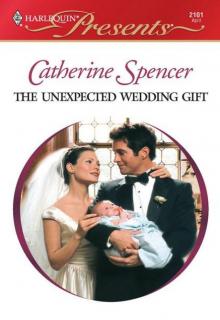- Home
- Catherine Spencer
MacKenzie's Promise Page 8
MacKenzie's Promise Read online
Page 8
It was her first contribution to the discussion, and he knew the reason she sounded so chilly had nothing to do with the fact that he was questioning her mother, and everything to do with what had taken place the night before.
“I agree,” he said, flicking a glance her way before redirecting his attention to Jessie. “Is June up to answering a few questions, do you think?”
Again, Linda put in her two bits’ worth. “She has to be. Otherwise we’ve wasted our time coming back here.”
“Not necessarily,” he said mildly. “I intend speaking to the people Thayer worked with, as well. But given that they lived together for several months, June’s probably our best source for any personal history he might have divulged.”
“Mom?” She turned to her mother. “Do we have to run this by her doctors, first?”
“I’m sure not,” Jessie said. “As long as we keep them informed, just so they can be ready for any adverse reaction, I don’t think there’ll be a problem.” She swung her chair away from the table. “We can leave as soon as you’re ready, Mac.”
“Let me give you a hand cleaning up in here first.”
“We don’t need your help,” Linda informed him sourly. “Marjorie will be here soon.”
“Marjorie?”
“My daily help,” Jessie supplied, and winked at him before she left the room, as though to say, Pay no attention to Linda. She’s not a morning person.
“Is it something I didn’t say that you think I should have?” he asked, collaring Linda before she also took off.
She regarded him with lofty disdain. “I haven’t the foggiest notion what you’re talking about.”
“Sure you have, cookie,” he said. “You’re in a snit about last night, and unless you want your mother asking awkward questions, I suggest you get over yourself.”
He should have known better than to tangle with a woman trying to cope with her own sexual appetites, especially when they’d announced themselves so blatantly and gone unsatisfied. “Get over yourself!” she spat. “My only feeling about last night is relief that we put an end to an ill-conceived idea before it got out of hand.”
Ill-conceived? An unfortunate choice of words, he thought, but one which might have been all too appropriate had he not come to his senses when he did. “Glad to hear you say that,” he replied. “Now prove you mean it and paste a smile on your face. June’s depressed enough as it is, from all accounts. She doesn’t need your long-suffering, poor-me attitude making her feel any lower.”
“Allow me to know what my sister can and can’t handle,” she shot back, “and confine yourself to doing the job I hired you to do.”
He folded his arms and fixed her in the kind of telling stare which, in the old days, could reduce hitherto smart and uncooperative suspects to babbling idiots willing to spill the truth at any cost. “Don’t make me regret that decision, Linda,” he said softly.
She bit her lip and glanced at her feet, clearly fighting the little demon inside urging her to tell him to take a running jump off a short pier. “I’m sorry. I’m a little…on edge.”
“Understandably. Just remember I’m not the enemy here.”
At first sight, June seemed better. She was dressed and sitting in the day lounge, instead of lying in bed in her room. Her hair was freshly shampooed, and she wore a little blusher to relieve the pallor of her cheeks. But on closer inspection, Linda saw the same emptiness in her eyes; felt the same lack of response when she hugged her.
“We’ve brought you a visitor, sweetie,” she said, hiding her disappointment behind a too-bright smile. “This is Mac and he’s going to find your baby for you.”
A flicker of something—hope? despair?—crossed June’s face. “Come along, darling,” her mother urged, reaching for her hand. “Let’s go find a quiet corner on the sunporch where we won’t be disturbed.”
She went willingly enough, a stick-thin figure moving like a sleepwalker being led back to the safety of the bedroom.
“Jeez,” Mac said in a low voice, following behind with Linda. “How long has she been like this?”
“Nearly a month.”
“She’s in bad shape, cookie. Ready to snap at the slightest provocation.”
“Yes.” She swallowed the sudden lump in her throat. “You see now why I came to you for help?”
“Yes,” he said, and caught her hand briefly, reassuringly. “I’ll give it my best shot.”
His best, she soon discovered, exceeded anything she’d expected. With skill and sensitivity he drew her sister out of the protective fog in which she’d hidden herself.
Within a very short time, he learned that Kirk Thayer had acquaintances but not many friends. That he seldom spoke about his ex-wife, but kept numerous photos of his son around the apartment. He was generous but used his wealth to control people. When he learned June was pregnant, he became obsessively concerned about her and the baby’s health to the point that he forbade her to drive her car or leave the apartment without telling him where she was going and when she’d be back. He phoned her constantly from work, and insisted on accompanying her to every doctor’s appointment. Although he became very upset when she told him she wouldn’t marry him, he never showed any violence toward her or gave any hint that he’d resort to such extreme measures after the baby’s birth.
“What can you tell me about his family?” Mac asked, shifting to another aspect of the man’s history.
“Which one?” June asked.
For a moment, he seemed floored by her question. “Not his ex-wife and son, honey. I mean his parents.”
“I know,” she said. “But which ones?”
“Most people only have two.”
“Not Kirk. He had his birth parents and those who adopted him.”
“I didn’t know he was adopted,” Linda exclaimed. “You never mentioned that before, June.”
“You never asked,” she said.
“But why didn’t you tell us anyway?” her mother said.
“Because you didn’t like him, Mom. You didn’t want to know anything about him.”
“But I do,” Mac said, gently drawing her attention back to the real issue. “Why don’t you tell me everything he told you?”
“His mother—he always called her his real mother—gave him up when he was seven.”
“Was he an only child?”
“No. He had a baby sister, but the mother kept her.”
“Do you know why?”
“They were very poor. She could only afford one child.”
“So he was placed for adoption and found a home with another couple?”
“Yes. And I think they were good people and treated him well. But he always wanted the Thayers, his real family. He spent thousands of dollars trying to trace his sister.”
“Did he ever find her?”
“Yes. She lives in Portland.”
Mac flicked a telling glance at Linda, his message clear. The Portland police had been contacted and found no trace of Kirk having been there in at least a year. Another dead end.
“You say his real family were called Thayer. Did he never take his adoptive parents’ name?”
“At first. But he said he changed back to his birth name a few years ago—right after his marriage broke down, I think.”
“Before you met him, then.” Mac tapped his pencil against the notebook on the table next to him. “Do you recall his ever mentioning his adoptive parents by name? Was he in contact with them at all?”
“Not very often,” she said. “But I thought they seemed awfully nice. They sent him gifts at Christmas and on his birthday. And when they found out I was pregnant, they sent me lovely baby clothes.” Her expression, which had become quite animated, darkened, and she plucked at the skirt of her dress. “I still have them, but they’ll be too small for her now.”
“Never mind, darling.” Her mother stroked her arm lovingly. “When Angela comes home, we’ll buy her new things.”
“She isn’t comin
g home,” June said, on a soft wail. “He’s taken her away where we can’t find her.”
“It’s my fault,” her mother whispered, the courage that had brought her this far crumbling in the face of June’s distress. “If I’d made him feel more welcome…”
“It’s nobody’s fault but his,” Linda said staunchly, her heart breaking for her sister, and for the pain and guilt she saw in her mother’s eyes. “And we will find her. Mac will find her.” She glared at him. “Tell her you will!”
When he didn’t immediately answer, June burst into tears.
“Tell her, damn you!”
He snapped his notebook closed. “Take your mother for a walk, Linda,” he said calmly, giving away nothing of what he had in mind. “Leave me alone with your sister.”
“Not a chance! Look at the shape she’s—”
“Do as I tell you.” His words, though softly uttered, nevertheless cut through her protest sharp as a whip.
“We’ll be in the cafeteria,” her mother said.
“We’ll be right outside the door,” Linda contradicted. “Close enough to hear every word. You’d better not upset her any more than you already have.”
“Whatever.” He dismissed her with a shrug and turned back to June. “Hey,” he said, almost crooning to her. “Dry those tears, sweet thing. We’re so close to cracking this investigation wide-open, I can practically taste success. Just a couple more questions, and we’ll be there.”
“I want my baby,” she sobbed.
“I want that, too, June. So, tell me…”
“Come away, darling,” her mother said, tugging at Linda’s skirt. “You trusted Mac enough to bring him here. Now let him get on with the job.”
He found them in the cafeteria fifteen minutes later, and strolled to their table, looking so carefully noncommittal that she knew at once he’d learned something significant which he wasn’t about to share. However, he wasn’t Detective Lieutenant Mac Sullivan on official business anymore. He was her paid employee—or would be, once he handed her a bill. And that gave her the right to know exactly what he knew, exactly as soon as he knew it.
“Well?” She eyed him balefully. “Kindly don’t keep us waiting. How’s June doing now, and have you found out anything useful?”
“To answer your first question, June was smiling when I left her, and in a much more upbeat frame of mind,” he said, positioning himself behind Jessie’s wheelchair. “As for your second, I’ve discovered a very serious loose end which should have been tied up weeks, if not months, ago. And if you haven’t yet figured out what that is, Linda, you’re not nearly as bright as I thought you were.”
CHAPTER SIX
HE WAS lying. Or if not that, then editing what he said. She’d have challenged him on it, if he hadn’t bared his teeth in a smile on a par with a shark about to swallow her whole, and under cover of retrieving his notebook, which he conveniently dropped at her feet, whispered in her ear, “Button up, cookie! We’ll get into this later when we’re alone.”
“Loose end?” Containing herself with difficulty, Linda struggled to remain civil. “Do you mind being more specific? In my opinion, this entire case is full of loose ends.”
“I’m talking about paperwork—in this instance, official documentation naming June as the primary custodial parent.”
Startled, she exchanged a look with her mother. “Do we have such a thing?”
“No, you don’t,” he said, answering before Jessie could open her mouth. “I asked June specifically if she ever applied to the courts, and she didn’t. We need to rectify that. At once. Which means making phone calls, speaking with a family court expert, and possibly arranging for someone to act as power of attorney on June’s behalf—that someone being you, Jessie.”
“Drop me off at home and I’ll get right on it,” she said.
He planted a kiss on her cheek. “You’re my kind of woman, sweetheart! I knew I could count on you to get the ball rolling.”
“What can I do?” Linda asked, absurdly resentful that he was so free with his compliments toward everyone but her.
“You can direct me to where Thayer worked and help me interview his former colleagues. With any luck, by tonight we should have a more complete picture of the man, and be better armed to put a halt to his actions.”
“Let’s meet at the house for dinner at seven,” her mother suggested, with something approaching her former zest. “We’ll have a round-table conference and pool our information, then see where to go from there.”
Whatever his other faults, Linda admitted to herself, Mac was turning out to be a real morale booster—at least as far as her mother and sister were concerned. Too bad she couldn’t make the same claim for herself.
“I don’t know why you’re making such a fuss about this custody business,” she said, after they’d driven her mother home in her specially equipped van and were headed across the bridge in his car, to the downtown office tower where Kirk had worked. “It strikes me as being a bit like closing the stable door after the horse has bolted.”
“That’s because you don’t understand how these things work,” he said, giving her knee a patronizing pat.
If she’d had a meat cleaver handy, she swore she’d have chopped off his hand! “Why don’t you educate me, then?”
“Well, it goes something like this,” he said, weaving through the heavy midmorning traffic with what struck her as cavalier disregard for life or limb. “With no outstanding court order favoring June, police involvement, both here and in the U.S. or anywhere else for that matter, is limited to the point that it becomes virtually ineffective.”
“How were we to know that? And who expects to have to apply for custody of a child within hours of her birth?”
“Anyone with reason to think his or her right to that child might be in jeopardy, and why no one brought that to your attention before now stuns me. Without the proper documents, no police department has the authority to seize a child, unless there’s compelling evidence either that the child has been unlawfully taken, or is in danger—danger, in this case, meaning that the abductor has a history of violence. Neither situation exists, and any attorney worth his salt could have told you that weeks ago.”
Loath though she was to admit it, Linda felt obliged to say, “I’m not sure June consulted a lawyer when the baby was stolen. I don’t think she saw the need. She thought it was a police matter.”
“Understandable, given the circumstances, but also unfortunate.”
“Are you saying it’s impossible to remedy the situation?”
He mulled over the question as she directed him to the underground parking area of Kirk’s office building. “Not impossible, but here’s the problem,” he said, maneuvering the Jaguar with impressive confidence into a spot she’d have thought was scarcely wide enough to accommodate a motorcycle. “The courts are notoriously slow-moving. You, on the other hand, have retained me to locate your niece as quickly as possible—preferably yesterday! Should I uphold my end of the bargain and find Angela, what then do you expect me to do?”
“Return her to her mother, of course!”
“How?”
She stared at him, floored by such a patently unnecessary question. “By seizing her, and bringing her back here with all due speed. I’m surprised you even have to ask!”
“I can’t seize her. And unless she’s living in a state of squalor and neglect, I can’t remove her from her present situation. And if you stop to think about what I’ve already explained about the way these matters work, you ought to be able to figure out why my hands are tied.”
Her heart sank like a stone. “You don’t have legal authority to remove her from her father’s care.”
“Exactly. But that’s not the worst of it, cookie.”
“It can get worse?” A fresh wave of dismay washed over her.
“It very well could, if Thayer has exercised the foresight to apply for his own custodial order. That would mean that if we tried to take Ange
la against his wishes, he could have you and me both arrested for kidnapping. If convicted, we’d be spending a lot of time in adjoining cells.”
She scrunched her eyes shut. “Oh, God! Does June know this?”
“No,” he said gently. “I could see no purpose in telling her just yet, or your mother, either, and I’m sorry to be laying it all on you like this. Hopefully I’m throwing up obstacles that don’t exist. But it seems only fair to warn you of the possible difficulties we might run into.”
“You did the right thing in telling me.” She squared her shoulders. “It’s better to be prepared.”
“I’m not suggesting we give up, you know.”
“I’m not, either. I’m not letting a creep like Kirk Thayer get the better of me.”
He grazed his knuckles down her cheek. “That’s my girl! Now let’s go talk to some people and see how much dirt we can dig up on him.”
There turned out to be very little.
“Kirk was competent, something of a loner, one of a hundred or more employees, and eminently forgettable. No one missed him when he was gone and probably wouldn’t have remembered his name if it hadn’t been splashed all over the front page of the newspapers in the days after he took off.” Discouraged despite her earlier resolution not to let Kirk get the upper hand, Linda leaned against the wall of the elevator as it carried them back to the parking level from the vice president’s glass-walled office on the twenty-eighth floor. “Got any more bright ideas, Detective Lieutenant Sullivan?”
“I think I should feed you. It might improve your outlook.”
“I’m not hungry.”
“Tough,” he said, as the elevator doors hissed open. “I am. The only choice you have is where we go to eat.”
“I don’t care.”
“Don’t sulk, Linda,” he chided, towing her unceremoniously behind him and bundling her into the car. “It’s unbecoming in a woman your age. And don’t take your frustration out on me. I’m not the enemy here, as I believe I’ve mentioned before.”
“No, Kirk Thayer is—and he always seems to be one step ahead of us. Every time we think we’re getting somewhere, we end up walking into a brick wall.”

 Dominic's Child
Dominic's Child MacKenzie's Promise
MacKenzie's Promise The Moretti Marriage
The Moretti Marriage The Italian s Convenient Wife
The Italian s Convenient Wife Mistress on His Terms
Mistress on His Terms The Millionaire's Marriage
The Millionaire's Marriage The Unexpected Wedding Gift
The Unexpected Wedding Gift Passion's Baby
Passion's Baby The Italian's Secret Child
The Italian's Secret Child Constantino's Pregnant Bride
Constantino's Pregnant Bride The Pregnant Bride
The Pregnant Bride Christmas With A Stranger_Forbidden
Christmas With A Stranger_Forbidden The Brabanti Baby
The Brabanti Baby Convenient Brides
Convenient Brides The Italian Doctor’s Mistress
The Italian Doctor’s Mistress The Secret Daughter
The Secret Daughter The Costanzo Baby Secret
The Costanzo Baby Secret The Doctor's Secret Child
The Doctor's Secret Child A Nanny in the Family
A Nanny in the Family D'Alessandro's Child
D'Alessandro's Child In the Best Man's Bed
In the Best Man's Bed